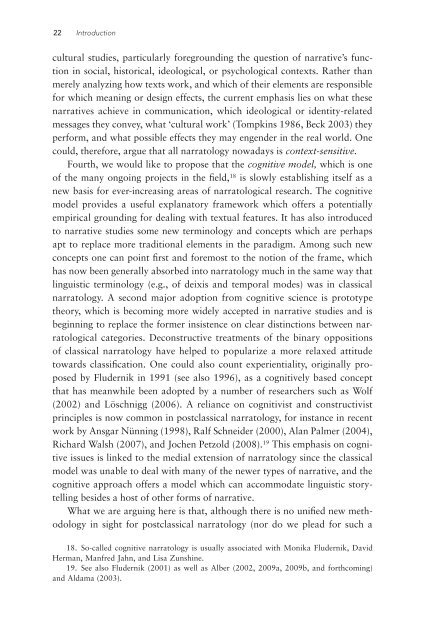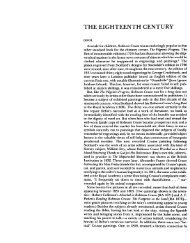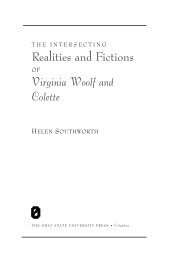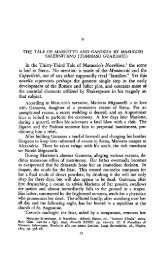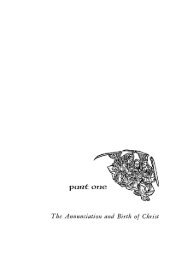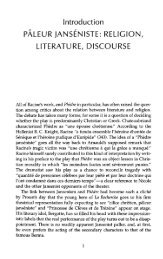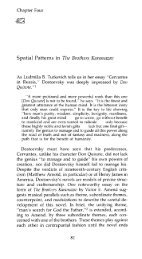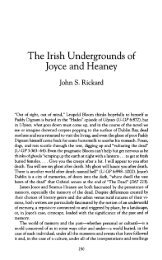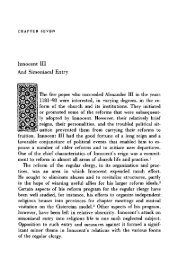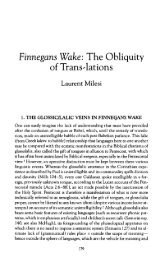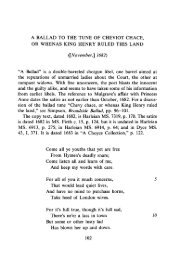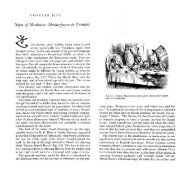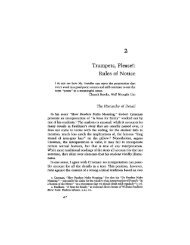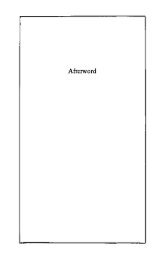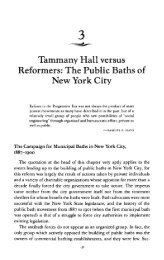Postclassical Narratology: Approaches and Analyses
Postclassical Narratology: Approaches and Analyses
Postclassical Narratology: Approaches and Analyses
Create successful ePaper yourself
Turn your PDF publications into a flip-book with our unique Google optimized e-Paper software.
22 Introduction<br />
cultural studies, particularly foregrounding the question of narrative’s function<br />
in social, historical, ideological, or psychological contexts. Rather than<br />
merely analyzing how texts work, <strong>and</strong> which of their elements are responsible<br />
for which meaning or design effects, the current emphasis lies on what these<br />
narratives achieve in communication, which ideological or identity-related<br />
messages they convey, what ‘cultural work’ (Tompkins 1986, Beck 2003) they<br />
perform, <strong>and</strong> what possible effects they may engender in the real world. One<br />
could, therefore, argue that all narratology nowadays is context-sensitive.<br />
Fourth, we would like to propose that the cognitive model, which is one<br />
of the many ongoing projects in the field, 18 is slowly establishing itself as a<br />
new basis for ever-increasing areas of narratological research. The cognitive<br />
model provides a useful explanatory framework which offers a potentially<br />
empirical grounding for dealing with textual features. It has also introduced<br />
to narrative studies some new terminology <strong>and</strong> concepts which are perhaps<br />
apt to replace more traditional elements in the paradigm. Among such new<br />
concepts one can point first <strong>and</strong> foremost to the notion of the frame, which<br />
has now been generally absorbed into narratology much in the same way that<br />
linguistic terminology (e.g., of deixis <strong>and</strong> temporal modes) was in classical<br />
narratology. A second major adoption from cognitive science is prototype<br />
theory, which is becoming more widely accepted in narrative studies <strong>and</strong> is<br />
beginning to replace the former insistence on clear distinctions between narratological<br />
categories. Deconstructive treatments of the binary oppositions<br />
of classical narratology have helped to popularize a more relaxed attitude<br />
towards classification. One could also count experientiality, originally proposed<br />
by Fludernik in 1991 (see also 1996), as a cognitively based concept<br />
that has meanwhile been adopted by a number of researchers such as Wolf<br />
(2002) <strong>and</strong> Löschnigg (2006). A reliance on cognitivist <strong>and</strong> constructivist<br />
principles is now common in postclassical narratology, for instance in recent<br />
work by Ansgar Nünning (1998), Ralf Schneider (2000), Alan Palmer (2004),<br />
Richard Walsh (2007), <strong>and</strong> Jochen Petzold (2008). 19 This emphasis on cognitive<br />
issues is linked to the medial extension of narratology since the classical<br />
model was unable to deal with many of the newer types of narrative, <strong>and</strong> the<br />
cognitive approach offers a model which can accommodate linguistic storytelling<br />
besides a host of other forms of narrative.<br />
What we are arguing here is that, although there is no unified new methodology<br />
in sight for postclassical narratology (nor do we plead for such a<br />
18. So-called cognitive narratology is usually associated with Monika Fludernik, David<br />
Herman, Manfred Jahn, <strong>and</strong> Lisa Zunshine.<br />
19. See also Fludernik (2001) as well as Alber (2002, 2009a, 2009b, <strong>and</strong> forthcoming)<br />
<strong>and</strong> Aldama (2003).


